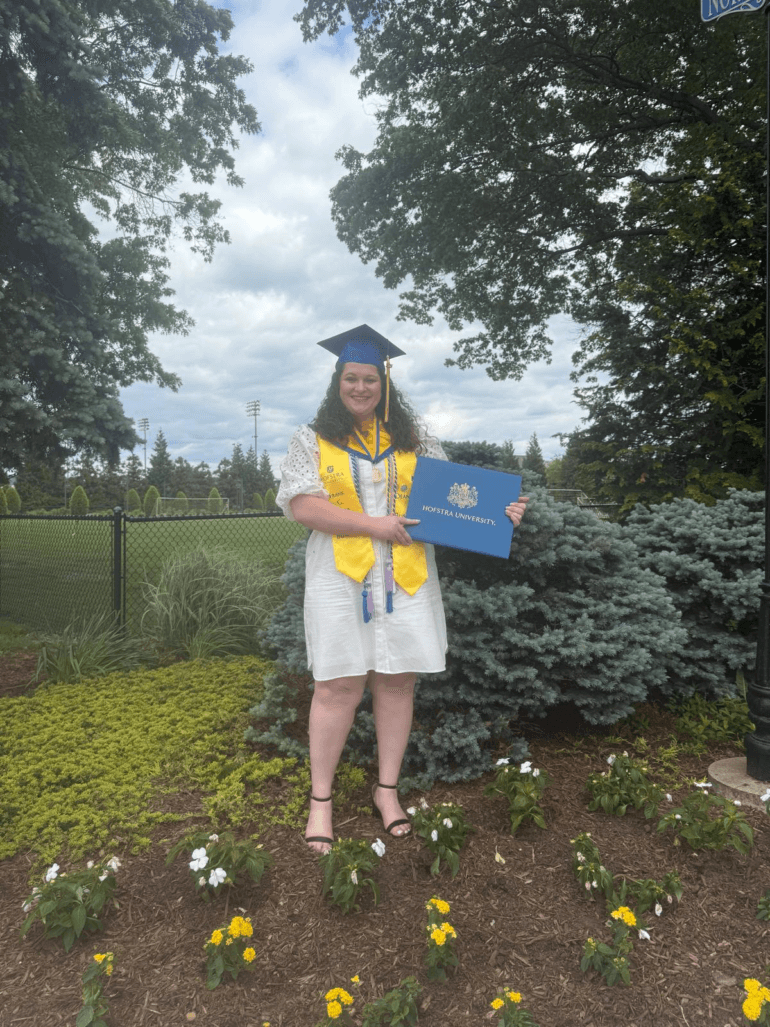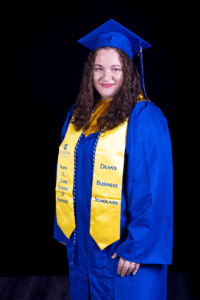
She Left The Hasidic Enclave of New Square. Now She’s Reclaiming Her Judaism and Her Future.
When Rebecca Blum walked across the graduation stage at Hofstra University this spring, donning her cap and gown, the diploma she carried bore the weight of everything it took to get there: years of healing her relationship with Judaism, and the slow, courageous process of making it through college.
Rebecca grew up in New Square, a Hasidic village in Rockland County, New York, made up predominantly of Skverer Hasidim, which she describes as “one of the most extreme Hasidic groups.” Her family structure felt challenging, and any sense of spiritual joy felt absent. “Judaism,” she says, “wasn’t something that brought me happiness.”
Eventually, the dissonance became too much to ignore. Rebecca made the difficult decision to leave the community she had been raised in. In the years that followed, she distanced herself from Judaism altogether, not out of apathy, but because the pain of her past experiences made it feel impossible to reengage.
Still, walking away from one version of Jewish life didn’t mean letting go of Judaism entirely—at least not forever. A few years ago, a friend told her about Makom, the Jew in the City branch that helps individuals find a path to a Judaism and Jewish community rooted in light, health, and positivity—by separating toxic experiences and dysfunctional people from faith itself.
At first, Rebecca dismissed the idea. “I thought, ‘It’s not for me,’” she recalled. But eventually, she gave it a try—and what she found changed everything. For the first time, she encountered Jewish lives that felt authentic, warm, and, most profound for Rebecca, joyfully expressed.
It was at Makom Shabbatons—hosted by religious families—that Rebecca saw a different kind of Judaism. “Makom led me to connect with families that became so important in my journey,” she said. “They didn’t follow a script. It was very profound and eye-opening for me that there are healthy families that have a healthy standard of living within Judaism.”
me to connect with families that became so important in my journey,” she said. “They didn’t follow a script. It was very profound and eye-opening for me that there are healthy families that have a healthy standard of living within Judaism.”
One moment in particular left a mark. At a Makom event, Dr. Yidi Sabiner, a Gur Hasid from Bnei Brak, shared his journey of becoming a doctor while part of the Hasidic community. Despite having no secular education and failing his first exam, he was eventually accepted to the Technion—“the MIT of Israel,” as Rebecca puts it. “If he can do it, I can do it.”
That story lit a spark. She realized she wanted to pursue college too. But the road ahead was anything but simple. Raised without a formal secular education, Rebecca had no SAT scores, no high school transcript, and no guidance on how to navigate the application process.
Still, she applied to Hofstra University six years after leaving high school—and to her amazement, she got in. “I don’t think I would have had the courage to go down my college journey without Makom,” she said. “It’s the best thing I’ve ever done for myself. I couldn’t be prouder.”
There were plenty of challenges along the way. “I didn’t even know how to write a paper or use the internet properly for research,” she said. “I had to teach myself algebra just to take calculus.” She paused her studies twice—once to care for her mental health, and once for financial reasons—but she never stopped moving forward.
“I show up for myself every day,” she said. “I could have given up so many times. But I’m still fighting for my place in the universe. I wake up and I’m trying to accomplish something every day. That means a lot to me.”
College also gave her something she hadn’t expected: support. And she found it in people she didn’t know she needed—her Honors College dean, her Hillel rabbi, and classmates who welcomed her, even though she was older than most.
“I very much felt, when I left the Jewish community, that I had to figure it all out on my own,” she said. “I had to do it all on my own. Because I was alone. I didn’t have a support system. But what I learned through this college journey is that a support system—like finding people that are there for you and letting them help you—is incredibly powerful.”
Now, Rebecca is looking ahead. She’s job-hunting, hoping to build a career in finance, and eager to finally engage more with the Jewish young adult community now that she finally has the time to look up from her textbooks.
She’s also continuing to embrace Judaism in a way that feels personal, meaningful, and—most of all—life-giving. “I do Judaism in a way that brings me joy,” she said. “Lighting candles Friday night, going to a Shabbat lunch, davening—if it brings me closer to my people and to a Higher Power, I do it.”
To others navigating the pain of religious trauma or rebuilding a Jewish identity, Rebecca offers this: “Follow your intuition. There are multiple truths within Judaism—you just have to find your own. With the right support and enough effort, your dreams can come true.”
And to her younger self in New Square? “It’s worth the struggle.”
If you found this content meaningful and want to help further our mission through our Keter, Makom, and Tikun branches, please consider becoming a Change Maker today.








1 comment
Sort by
Everyone keep struggling to find your own spiritual place where you belong. I identify.